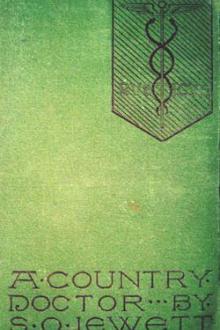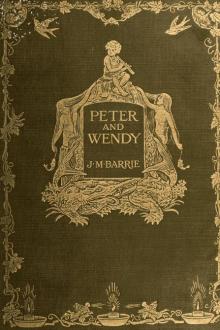A Country Doctor by Sarah Orne Jewett (top novels TXT) 📕

- Author: Sarah Orne Jewett
- Performer: -
Book online «A Country Doctor by Sarah Orne Jewett (top novels TXT) 📕». Author Sarah Orne Jewett
The doctor was acknowledged to be an old man at last, though everybody still insisted that he looked younger than his age, and could not doubt that he had half a lifetime of usefulness before him yet. But it makes a great difference when one's ambitions are transferred from one's own life to that of a younger person's; and while Dr. Leslie grew less careful for himself, trusting to the unconscious certainty of his practiced skill, he pondered eagerly over Nan's future, reminding himself of various hints and suggestions, which must be added to her equipment. Sometimes he wished that she were beginning a few years later, when her position could be better recognized and respected, and she would not have to fight against so much of the opposition and petty fault-finding that come from ignorance; and sometimes he rejoiced that his little girl, as he fondly called her, would be one of the earlier proofs and examples of a certain noble advance and new vantage-ground of civilization. This has been anticipated through all ages by the women who, sometimes honored and sometimes persecuted, have been drawn away from home life by a devotion to public and social usefulness. It must be recognized that certain qualities are required for married, and even domestic life, which all women do not possess; but instead of attributing this to the disintegration of society, it must be acknowledged to belong to its progress.
So long as the visit in Dunport seemed to fulfill its anticipated purpose, and the happy guest was throwing aside her cares and enjoying the merry holiday and the excitement of new friendships and of her uncommon position, so long the doctor had been glad, and far from impatient to have the visit end. But when he read the later and shorter letters again and again in the vain hope of finding something in their wording which should explain the vague unhappiness which had come to him as he had read them first, he began to feel troubled and dismayed. There was something which Nan had not explained; something was going wrong. He was sure that if it were anything he could set right, that she would have told him. She had always done so; but it became evident through the strange sympathy which made him conscious of the mood of others that she was bent upon fighting her way alone.
It was a matter of surprise, and almost of dismay to him early one morning, when he received a brief note from her which told him only that she should be at home late that afternoon. It seemed to the wise old doctor a day of most distressing uncertainty. He tried to make up his mind to accept with true philosophy whatever decision she was bringing him. "Nan is a good girl," he told himself over and over again; "she will try to do right." But she was so young and so generous, and whether she had been implored to break the old ties of home life and affection for her aunt's sake, or whether it was a newer and stronger influence still which had prevailed, waited for explanation. Alas, as was written once, it is often the higher nature that yields, because it is the most generous. The doctor knew well enough the young girl's character. He knew what promises of growth and uncommon achievement were all ready to unfold themselves,—for what great uses she was made. He could not bear the thought of her being handicapped in the race she had been set to run. Yet no one recognized more clearly than he the unseen, and too often unconsidered, factor which is peculiar to each soul, which prevents any other intelligence from putting itself exactly in that soul's place, so that our decisions and aids and suggestions are never wholly sufficient or available for those even whom we love most. He went over the question again and again; he followed Nan in his thoughts as she had grown up,—unprejudiced, unconstrained as is possible for any human being to be. He remembered that her heroes were the great doctors, and that her whole heart had been stirred and claimed by the noble duties and needs of the great profession. She had been careless of the social limitations, of the lack of sympathy, even of the ridicule of the public. She had behaved as a bird would behave if it were assured by beasts and fishes that to walk and to swim were the only proper and respectable means of getting from place to place. She had shown such rare insight into the principles of things; she had even seemed to him, as he watched her, to have anticipated experience, and he could not help believing that it was within her power to add much to the too small fund of certainty, by the sure instinct and aim of her experiment. It counted nothing whether God had put this soul into a man's body or a woman's. He had known best, and He meant it to be the teller of new truth, a revealer of laws, and an influence for good in its capacity for teaching, as well as in its example of pure and reasonable life.
But the old doctor sighed, and told himself that the girl was most human, most affectionate; it was not impossible that, in spite of her apparent absence of certain domestic instincts, they had only lain dormant and were now awake. He could not bear that she should lose any happiness which might be hers; and the tender memory of the blessed companionship which had been withdrawn from his mortal sight only to be given back to him more fully as he had lived closer and nearer to spiritual things, made him shrink from forbidding the same sort of fullness and completion of life to one so dear as Nan. He tried to assure himself that while a man's life is strengthened by his domestic happiness, a woman's must either surrender itself wholly, or relinquish entirely the claims of such duties, if she would achieve distinction or satisfaction elsewhere. The two cannot be taken together in a woman's life as in a man's. One must be made of lesser consequence, though the very natures of both domestic and professional life need all the strength which can be brought to them. The decision between them he knew to be a most grave responsibility, and one to be governed by the gravest moral obligations, and the unmistakable leadings of the personal instincts and ambitions. It was seldom, Dr. Leslie was aware, that so typical and evident an example as this could offer itself of the class of women who are a result of natural progression and variation, not for better work, but for different work, and who are designed for certain public and social duties. But he believed this class to be one that must inevitably increase with the higher developments of civilization, and in later years, which he might never see, the love for humanity would be recognized and employed more intelligently; while now almost every popular prejudice was against his ward, then she would need no vindication. The wielder of ideas has always a certain advantage over the depender upon facts; and though the two classes of minds by no means inevitably belong, the one to women, and the other to men, still women have not yet begun to use the best resources of their natures, having been later developed, and in many countries but recently freed from restraining and hindering influences.
The preservation of the race is no longer the only important question; the welfare of the individual will be considered more and more. The simple fact that there is a majority of women in any centre of civilization means that some are set apart by nature for other uses and conditions than marriage. In ancient times men depended entirely upon the women of their households to prepare their food and clothing,—and almost every man in ordinary circumstances of life was forced to marry for this reason; but already there is a great change. The greater proportion of men and women everywhere will still instinctively and gladly accept the high duties and helps of married life; but as society becomes more intelligent it will recognize the fitness of some persons, and the unfitness of others, making it impossible for these to accept such responsibilities and obligations, and so dignify and elevate home life instead of degrading it.
It had been one thing to act from conviction and from the promptings of instinct while no obstacles opposed themselves to his decisions, and quite another thing to be brought face to face with such an emergency. Dr. Leslie wished first to be able to distinctly explain to himself his reasons for the opinions he held; he knew that he must judge for Nan herself in some measure; she would surely appeal to him; she would bring this great question to him, and look for sympathy and relief in the same way she had tearfully shown him a wounded finger in her childhood. He seemed to see again the entreating eyes, made large with the pain which would not show itself in any other way, and he felt the rare tears fill his own eyes at the thought. "Poor little Nan," he said to himself, "she has been hurt in the great battle, but she is no skulking soldier." He would let her tell her story, and then give her the best help he could; and so when the afternoon shadows were very long across the country, and the hot summer day was almost done, the doctor drove down the wide street and along East Road to the railroad station. As he passed a group of small houses he looked at his watch and found that there was more than time for a second visit to a sick child whose illness had been most serious and perplexing at first, though now she was fast recovering. The little thing smiled as her friend came in, and asked if the young lady were coming to-morrow, for Dr. Leslie had promised a visit and a picture-book from Nan, whom he wished to see and understand the case. They had had a long talk upon such ailments as this just before she went away, and nothing had seemed to rouse her ambition so greatly as her experiences at the children's hospitals the winter before. Now, this weak little creature seemed to be pleading in the name of a great army of sick children, that Nan would not desert their cause; that she would go on, as she had promised them, with her search for ways that should restore their vigor and increase their fitness to take up the work of the world. And yet, a home and children of one's very own,—the doctor, who had held and lost this long ago, felt powerless to decide the future of the young heart which was so dear to him.
Nan saw the familiar old horse and carriage waiting behind the station, and did not fail to notice that the doctor had driven to meet her himself. He almost always did, but her very anxiety to see him again had made her doubtful. The train had hardly stopped before she was standing on





Comments (0)